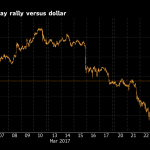Yen fell as the central bank moved to reassert control over rising yields

-
Shanghai shares slip as trading resumes after holiday
-
Focus turns to U.S. jobs as investors seek clues on economy
Japanese government bonds swung and the yen fell as the central bank moved to reassert control over rising yields, while money market rates rose in China after officials boosted their target for a key benchmark.
Japanese 10-year yields erased gains and the yen dropped after the Bank of Japan offered to buy an unlimited amount of bonds at a fixed rate in an unscheduled operation. In China, one-year interest-rate swaps climbed to the highest level this year as the central bank raised the rates it charges in open-market operations, in another step to tighten monetary policy. Japanese stocks climbed for the second time in three days, while shares slipped in Shanghai after a week-long holiday. The S&P 500 Index closed with a gain of less than two points for a second straight day before U.S. jobs data.
Investors focused on moves by central banks, as policy makers from Japan to the U.S. try to assess the impact of America’s new leadership on global growth. The Bank of Japan’s move came after an earlier attempt Friday morning to cap yields by expanding bond purchases in a regular operation disappointed investors. In China, the central bank has been tightening cash supply since August to curb leverage in the financial system, rein in price gains and support the exchange rate.
Investors continue to look for clues on economic strength amid a wave of corporate earnings. While signs point to increasing confidence that growth will accelerate, data have painted a murkier picture, increasing the significance of Friday’s jobs report.

What’s coming up for the markets:
- Economists expect a 175,000 increase in U.S. nonfarm payrolls for January, in line with the recent trend, when the Labor Department releases jobs data on Friday. With both hiring and unemployment likely to remain relatively stable, the focus on the jobs report will center on wage pressures.
Here are the main market moves for Friday:
Bonds
- Japanese 10-year yields fell two basis points, after earlier gaining as much as four basis points to 0.15 percent, the highest since the central bank implemented its negative rate policy last January. Investors are testing BOJ Governor Haruhiko Kuroda’s resolve to maintain a five-month old policy of holding 10-year debt at around zero percent, as accelerating inflation and an improving outlook for some of the world’s biggest economies push up bond yields globally.
- In China, one-year interest-rate swaps climbed as much as 12 basis points to 3.43 percent, the highest since Dec. 28, while the seven-day repurchase rate pared declines to 13 basis points to trade at 2.50 percent, according to a weighted average. Ten-year government bonds were little changed.
- The yield on the 10-year U.S. Treasury note added one basis point to 2.48 percent.
Stocks
- The Topix Index climbed 0.3 percent and Australia’s S&P/ASX 200 Index fell 0.4 percent. New Zealand’s main gauge added 0.6 percent.
- The Shanghai Composite Index lost 0.5 percent on its first day of trading since Jan. 26.
- Futures on the S&P 500 were down 0.1 percent. The index has gained or retreated by less than 0.1 percent for five of the past six days, and is down 0.6 percent on the week.
Currencies
- The Bloomberg Dollar Spot Index rose 0.2 percent. It is still set for its steepest weekly drop since November, down 1 percent.
- The Aussie was down 0.1 percent to 76.52 U.S. cents. It surged 1 percent Thursday after government data showed a record trade surplus for December.
- The yen was at 113.10 per dollar, down 0.3 percent but still up 1.9 percent on the week.
Commodities
- West Texas Intermediate crude rose 0.6 percent to $53.87 a barrel. It’s headed for a third weekly gain amid estimates that OPEC reached about 60 percent of its output-cut target.
- Gold declined 0.2 percent to $1,213.21 an ounce, paring its gain for the week to 1.9 percent.
Source: Bloomberg





























